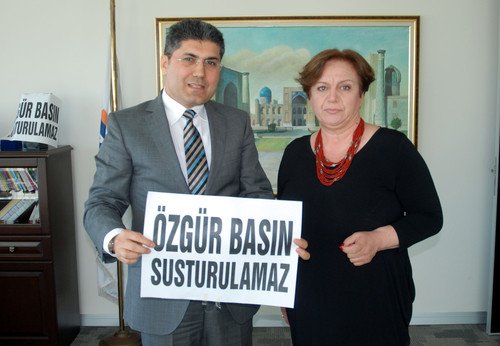Vahit Yazgan, bureau chief of shuttered Zaman daily in Turkey’s western province of İzmir, has been under arrest over an anonymous letter alleging that he is a member of a terrorist organization.
Yazgan, 48-year-old veteran journalist was detained in İzmir following abortive coup attempt on July 15, 2016. He was kept in detention for 18 days under abusive conditions and the authorities did not tell him what are the charges against him and what evidence the government has, if any.
On August 26, 2016, he was formally arrested by an İzmir court over fabricated charges that he has administered an armed terror organization and placed in Buca Kırıklar Prison.

The indictment penned by public prosecutor months later revealed that an anonymous letter claiming that he is a member of a terror organization without any evidence led to his detention and arrest. He faces 22-year prison sentence if convicted.
The journalist is also accused of using smart phone application, namely, ByLock, which is a messaging service similar to WhatsApp, Signal, Skype and Blackberry messenger. Yazgan rejected he has ever used that application although it was not illegal to use that application at the time.
Yazgan is also charged with having an account at Bank Asya that is affiliated with the Gülen movement which was one of the three banks with the highest liquidity in Turkey until it was unlawfully taken over by the government on February 4, 2015.
A report published by Stockholm Center for Freedom (SCF) has revealed the absurd pretexts used by prosecutors to indict suspects. Judges routinely jail innocent people who are alleged to have been affiliated with the Gülen movement, a civic group that is active in education, community empowerment and interfaith dialogue. Thus, the report finds that the fundamental principle of law such as “no crime without law” intentionally, widely and systematically has been violated.
The public prosecutor also presents daily and routine journalism activities as a crime in the indictment. Yazgan’s meetings with local politicians, officials and businessmen are reviewed as acts of terror. Yazgan is accused of infiltrating İzmir branch of a small political party, Büyük Birlik Partisi (Grand Union Party) that got only 0,53 percent of the popular vote in the last general election in 2015.

The prosecutor claims that Yazgan was leading a Quran study circle for the businessmen in İzmir when such activity is no crime under the Turkish Penal Code. However, Yazgan strongly denied it by saying that “I am not a religious person at all, I cannot even recite Quran, holy book of Islam. How could I give sermon on religious issues?”
On July 1, 2017 Yazgan appeared before judges for the first time in 11 months after his arrest. He rejected all charges against him and claimed that the prosecutor had no concrete evidence to substantiate very serious terror accusations.
“I have never used Bylock,” said Yazgan and added “I had a Bank Asya account because my payroll payment was being deposited at that bank by my employer, Zaman daily”
“Before anything else, I am a human. I have been a journalist more than 25 years. I am an intellectual who has devoted his life to democracy. I have written numerous news stories that were against military coups. No one has the right to question my patriotism,” said Yazgan in the first hearing while responding to prosecutor’s claims that he was involved in attempts of overthrowing the government.
“I would not have worked at Zaman daily if there had been a single judicial ruling that I must not,” added Yazgan. Zaman was the largest circulated mainstream daily in Turkey until the government seized on March 4, 2016 and later shut it down in July 2016.
The court ruled for the continuation of his arrest.
The second hearing was held on September 7, 2017. Yazgan repeated that there was no evidence against him in the indictment.
Yazgan rejected the cell phone tower relay signals that put him in the company of other suspects along with tens of thousands of people in an area covered by the tower.
“I met many people because of my profession. I am a journalist. Moreover, my mobile phone’s signals may surely coincide with other people’s in the coverage area. That is very normal and does not make any sense,” said Yazgan.
The court again ruled for the continuation of Yazgan’s arrest and decided to ask authorities whether he had used Bylock and the content of messages. The court also demanded an expert opinion on Yazgan’s Bank Asya account activities.
Yazgan was born in Adana, a southern province of Turkey in 1969. He graduated from Marmara University’s Faculty of Communications in 1991. He started his media career at Zaman daily’s Adana office as a reporter. He then became news chief of the office.
In 2001, he moved to İstanbul when he took a job deputy local news editor in Cihan news agency, a sister company of Zaman daily. Then he became local news editor at Zaman.
In 2007, he became the internet editor, and in 2009 he was appointed as the bureau chief of Zaman in İzmir.
He was the bureau chief until Zaman was unlawfully seized by the government in March 2016. The government-appointed trustees who took over the management in order to turn Zaman into a government’s propaganda paper closed local offices and dismissed entire staff.
Married with a son, Yazgan is looking forward reuniting with his loved ones again.
His next trial will be held in February 2018
Turkey is the biggest jailer of journalists in the world. The most recent figures documented by the SCF has showed that 244 journalists and media workers are in jails as of December 26, 2017, most in pre-trial detention languishing in notorious Turkish prisons without even a conviction. Of those in Turkish prisons, 217 are arrested pending trial, only 27 journalists remain convicted and serving time in Turkish prisons. An outstanding detention warrants remain for 139 journalists who live in exile or remain at large in Turkey.
Detaining tens of thousands of people over alleged links to the Gülen movement, the government also closed down more than 180 media outlets after the controversial coup attempt.
Turkey survived a controversial military coup attempt on July 15, 2016 that killed 249 people. Immediately after the putsch, the Justice and Development Party (AKP) government along with President Erdoğan pinned the blame on the Gülen movement.
Gülen, who inspired the movement, strongly denied having any role in the failed coup and called for an international investigation into it, but President Erdoğan — calling the coup attempt “a gift from God” — and the government initiated a widespread purge aimed at cleansing sympathizers of the movement from within state institutions, dehumanizing its popular figures and putting them in custody.
Turkey has suspended or dismissed more than 150,000 judges, teachers, police and civil servants since July 15. Turkey’s Interior Minister announced on December 12, 2017 that 55,665 people have been arrested. Previously, on December 13, 2017, The Justice Ministry announced that 169,013 people have been the subject of legal proceedings on coup charges since the failed coup.















